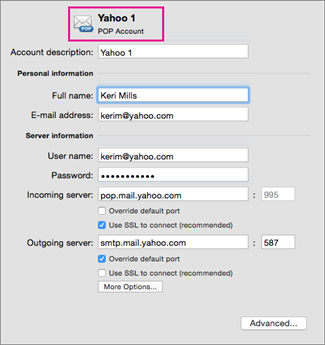For steps on how to use these settings to set up an initial account or add more accounts in the Outlook for Mac Accounts box, see Add an email account to Outlook.

Use the information in the table below to understand or adjust the settings for your POP email account.
|
Option |
Description |
|
Account description |
This is how your account is labeled in Outlook. You can give the account any name that is helpful to you. |
|
Full name |
This is how your name appears in the From field of e-mail messages that you send. |
|
Email address |
You must type your complete e-mail address, such as someone@example.com. |
|
User name |
Depending on your e-mail provider, this is usually either your full e-mail address or the part of your e-mail address before the "@" symbol. |
|
Password |
This is the password for your account. Usually this password is usually case-sensitive. |
|
Incoming server |
The incoming mail server for a POP account may also be called the POP, or POP3, server. For example, if your email provider is example.com, the incoming mail server is likely pop3.example.com. |
|
Override default port |
To be able to edit the port number that follows the server address, select this check box. |
|
Use SSL to connect (recommended) |
Secure Sockets Layer (SSL) is an encryption technology that helps improve the security of the account. |
|
Outgoing server |
This server sends your messages. It may also be called the SMTP server. For example, if your email provider is example.com, the outgoing mail server is likely smtp.example.com. |
|
Override default port |
To be able to edit the port number that follows the server address, select this check box. |
|
Use SSL to connect (recommended) |
Secure Sockets Layer (SSL) is an encryption technology that helps improve the security of the account. |
|
More Options |
Click the More Options button to enter authentication for the outgoing server, or to set an unqualified domain. |










